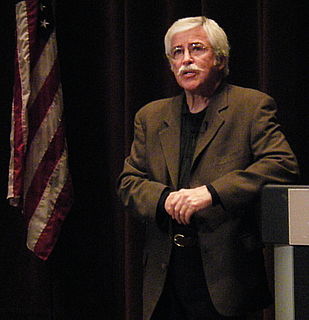A Quote by Stephen Hawking
If the rate of expansion one second after the Big Bang had been smaller by even one part in a hundred thousand million million, it would have recollapsed before it reached its present size. On the other hand, if it had been greater by a part in a million, the universe would have expanded too rapidly for stars and planets to form.
Related Quotes
The gravitational constant, if it were off by one part in a hundred million million, then the expansion of the universe after the Big Bang would not have occurred in the fashion that was necessary for life to occur. When you look at that evidence, it is very difficult to adopt the view that this was just chance.
There are 15 constants- the gravitational constant, various constants about the strong and weak nuclear force, etc.- that have precise values. If any one of those constants was off by even one part in a million, or in some cases, by one part in a million million, the universe could not have actually come to the point where we see it. Matter would not have been able to coalesce, there would have been no galaxy, stars, planets or people
One can imagine that God created the universe at literally any time in the past. On the other hand, if the universe is expanding, there may be physical reasons why there had to be a beginning. One could imagine that God created the universe at the instant of the big bang, or even afterwards in just such a way as to make it look as though there had been a big bang, but it would be meaningless to suppose that it was created before the big bang. An expanding universe does not preclude a creator, but it does place limits on when he might have carried out his job!
During the fiscal year ending in 1861, expenses of the federal government had been $67 million. After the first year of armed conflict they were $475 million and, by 1865, had risen to one billion, three-hundred million dollars. On the income side of the ledger, taxes covered only about eleven per cent of that figure. By the end of the war, the deficit had risen to $2.61 billion. That money had to come from somewhere.
(On the energy radiated by the Sun) It's four hundred million million million million watts. That is a million times the power consumption of the United States every year, radiated in one second, and we worked that out by using some water, a thermometer, a tin, and an umbrella. And that's why I love physics.
The truth is that the 143 million orphaned children and the 11 million who starve to death or die from preventable diseases and the 8.5 million who work as child slaves, prostitutes, or under other horrific conditions and the 2.3 million who live with HIV add up to 164.8 million needy children. And though at first glance that looks like a big number, 2.1 billion people on this earth proclaim to be Christians. The truth is that if only 8 percent of the Christians would care for one more child, there would not be any statistics left.


































